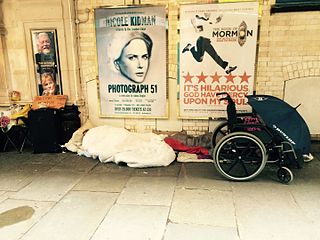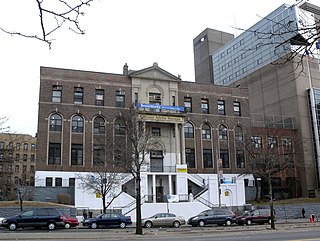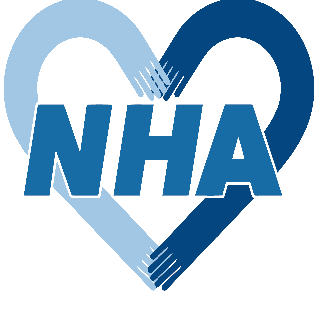Related Research Articles

In the United States, the number of homeless people varies from different federal government accounts. In 2014, approximately 1.5 million sheltered homeless people were counted. In 2018, the Department of Housing and Urban Development estimated roughly 553,000 homeless people in the United States on a given night, or 0.17 percent of the population. Approximately 65 percent of people were sheltered in provided housing while 35 percent were unsheltered. Annual federal HUD reports contradict private state and local reports where homelessness is shown to have increased each year since 2014 across several major American cities, with 40 percent increases noted in 2017 and in 2019.

Citizens Advice is an independent organisation specialising in confidential information and advice to assist people with legal, debt, consumer, housing and other problems in the United Kingdom.

Shelter is a registered charity that campaigns for tenant rights in Great Britain. It gives advice, information and advocacy to people and lobbies government and local authorities for new laws and policies. It works in partnership with Shelter Cymru in Wales and the Housing Rights Service in Northern Ireland. The charity was founded in 1966 and raised 48.2 million pounds in 2020/21.
Women's Aid Federation of England, commonly called Women's Aid within England, is one of a group of charities across the United Kingdom. There are four main Women's Aid Federations, one for each of the countries of the United Kingdom. Its aim is to end domestic violence against women and children. The charity works at both local and national levels to ensure women's safety from domestic violence and promotes policies and practices to prevent domestic violence.
Supportive housing is a combination of housing and services intended as a cost-effective way to help people live more stable, productive lives, and is an active "community services and funding" stream across the United States. It was developed by different professional academics and US governmental departments that supported housing. Supportive housing is widely believed to work well for those who face the most complex challenges—individuals and families confronted with homelessness and who also have very low incomes and/or serious, persistent issues that may include substance use disorders, mental health, HIV/AIDS, chronic illness, diverse disabilities or other serious challenges to stable housing.

In England, local authorities have duties to homeless people under Part VII of the Housing Act 1996 as amended by the Homelessness Act 2002. There are five hurdles which a homeless person must overcome in order to qualify as statutory homeless. If an applicant only meets the first three of these tests Councils still have a duty to provide interim accommodation. However an applicant must satisfy all five for a Council to have to give an applicant "reasonable preference" on the social housing register. Even if a person passes these five tests councils have the ability to use the private rented sector to end their duty to a homeless person.
Energy Saving Trust is a British organization devoted to promoting energy efficiency, energy conservation, and the sustainable use of energy, thereby reducing carbon dioxide emissions and helping to prevent man-made climate change. It was founded in the United Kingdom as a government-sponsored initiative in 1992, following the global Earth Summit.
Shelter Cymru describes itself as Wales's people and homes charity. Its vision is that a decent, secure home is a fundamental right and essential to the health and well-being of communities.

The United States Interagency Council on Homelessness (USICH) is an independent federal agency within the U.S. executive branch that leads the implementation of the federal strategic plan to prevent and end homelessness. USICH is advised by a Council, which includes the heads of its 20 federal member agencies. The immediate past chair was Department of Health and Human Services Secretary Sylvia Mathews Burwell, and the vice chair was Secretary of Education John King. USICH partners with these 19 federal agencies, state and local governments, advocates, service providers, and people experiencing homelessness to achieve the goals outlined in the first federal strategic plan to prevent and end homelessness, Opening Doors.

Homelessness in the United Kingdom is measured and responded to in differing ways in England, Scotland, Wales and Northern Ireland, but affects people living in every part of the UK's constituent countries.
Welfare rights means the rights of people to be aware of and receive their maximum entitlement to state welfare benefits, and to be treated reasonably well by the welfare system. It has been established in the United Kingdom since 1969 and has also been developed in other countries including Ireland, Australia and the United States. It became necessary because of the complexity of the UK social security system and had links at the time with a growing Claimants Union movement. As local authorities realized the advantages of having well-informed front-line staff such as housing officers and social workers, who often have to deal with benefit queries as part of their wider tasks, they turned to welfare rights staff to provide that expertise for both training and handling complex cases. In the 1980s, as local authorities took on the wider 'equalities' agenda, anti-poverty work was seen as a valid local activity in itself. Increasing benefit income helps individuals but also boosts the local economy.
Public housing policies in Canada includes rent controls, as well as subsidized interest rates and grants. Early public housing policy in Canada consisted of public-private lending schemes which focused on expanding home ownership among the middle class. The first major housing initiative in Canada was the Dominion Housing Act of 1935, which increased the amount of credit available for mortgage loans.

Homelessness or houselessness – also known as a state of being unhoused or unsheltered – is the condition of lacking stable, safe, and functional housing. The general category includes many disparate situations, including:

BronxWorks is a human service organization and settlement house based in the Bronx, New York City that was founded as Citizens Advice Bureau in the Morris Heights section in 1972. The founders, social worker Mildred Zucker of the Federation of Protestant Welfare Agencies and a group of local clergy, elected officials, and community advocates, initially modeled the organization on a similar agency in the United Kingdom, in which walk-in offices were established in every county to assist residents on queries about topics such as housing–related matters, consumer issues, and entitlements.

The National Health Action Party (NHA) is a political party in the United Kingdom.

The Homelessness Act 2002 is an Act of the Parliament of the United Kingdom. It amends the Housing Act 1996 and sets out the duties owed by local housing authorities to someone who is homeless or threatened with homelessness.

Succession rights in the United Kingdom is an area of housing law concerning the ability to pass on their tenancy when they die something known as a succession.
Homelessness and aging is a largely neglected topic in the literature. There is a widespread assumption that aged homeless people are rare, but this is not true. Japan, Australia and the United Kingdom show increases in their populations of aging homelessness. Increased Elderly adults who straddle the poverty line are at greater risk of falling into pathways of homelessness. When a homeless person enters their later years, or becomes homeless for the first time in older age, health issues can become difficult to address and compound as age progresses.
In early March 2017, thousands of members of the group Kalipunan ng Damayang Mahihirap and other informal settlers illegally occupied an idle housing project of the National Housing Authority (Philippines) (NHA), in Pandi, Bulacan, in the Philippines.

Squatting in the Philippines occurs when people build makeshift houses called "barong-barong"; urban areas such as Metro Manila, Metro Cebu, and Metro Davao have large informal settlements. The Philippine Statistics Authority has defined a squatter, or alternatively "informal dwellers", as "One who settles on the land of another without title or right or without the owner's consent whether in urban or rural areas". Squatting is criminalized by the Urban Development and Housing Act of 1992, also known as the Lina Law. There have been various attempts to regularize squatter settlements, such as the Zonal Improvement Program and the Community Mortgage Program. In 2018, the Philippine Statistics Authority estimated that out of the country's population of about 106 million, 4.5 million were homeless.